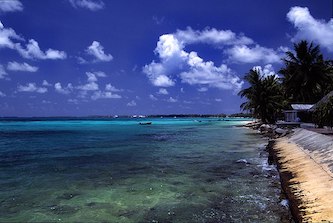A country named Australia is going to help people from a small place called Tuvalu because the water is getting higher there. Australia will let 280 people from Tuvalu come every year to live, learn, and work. This is the first time Australia is doing this because of the water getting higher. Australia is also going to give money to help Tuvalu fight the water and keep their land safe. They will also keep Tuvalu safe from other people who might want to fight.
Tuvalu is a very small place with not many people. The water is getting higher and it might cover their land. But the people there want to keep their country, even if the land goes under the water. They are also making a computer world to save their stories and ways of living. Australia is helping them and saying they are friends.
Original news source: Australia offers climate refuge to Tuvalu citizens (BBC)
Listen
Slow
Normal
Fast
Group or Classroom Activities
Warm-up Activities:
– Vocabulary Pictionary
Instructions: Divide the class into two teams. Use key vocabulary from the article such as “Australia,” “Tuvalu,” “water,” “land,” “safe,” and “stories.” One student from a team comes up and draws a picture representing one of the words without speaking while their team tries to guess the word. Each correct guess earns a point for the team. Alternate teams for each word.
– News Reporter Role-play
Instructions: Pair up students and assign them roles as a news reporter and a citizen from Tuvalu. Provide them with key points from the article to discuss, such as the agreement with Australia, the rising water levels, and the creation of a computer world. Encourage them to use simple present tense to explain the situation and ask and answer questions.
– Opinion Poll
Instructions: Write down statements related to the article on the board, like “It’s good that Australia is helping Tuvalu,” or “Countries should do more to fight water levels rising.” Students walk around the room and sign their names under the statements they agree with. Afterward, discuss the results as a class and encourage students to explain their opinions using simple sentences.
– Sketch It
Instructions: On the board, draw a basic map with Australia and Tuvalu. Give students a list of simple sentences or phrases from the article like “Australia helps Tuvalu,” “280 people can go to Australia,” or “Tuvalu is very small.” In pairs, students take turns sketching concepts from the sentences on the map, such as arrows to show movement from Tuvalu to Australia or symbols for concepts like “help” or “safety.” Other students guess the phrases based on the sketches.
– Future Predictions
Instructions: Ask students to imagine the future of Tuvalu and Australia’s relationship based on the information in the article. Students write down simple sentences using future tense, such as “More people will move to Australia” or “Tuvalu will build a computer world.” Then, they share their predictions with a partner and discuss whether they think these predictions are happy or sad and why.
Comprehension Questions:
1. What country is going to help the people from Tuvalu?
2. How many people from Tuvalu can go to Australia every year?
3. Why is Australia letting people from Tuvalu come?
4. What will Australia give to Tuvalu to help them with the water?
5. What is happening to the land in Tuvalu?
6. What do the people of Tuvalu want to do with their country?
7. What are the people of Tuvalu making on the computer?
Go to answers ⇩
Listen and Fill in the Gaps:
A (1)______ named Australia is going to help people from a small (2)______ called Tuvalu because the water is getting higher there. Australia will let 280 people from Tuvalu come every year to live, learn, and (3)______. This is the first time Australia is doing this because of the water getting higher. Australia is also going to give money to help Tuvalu fight the water and (4)______ their land safe. They will also keep (5)______ safe from other people who might want to fight.
Tuvalu is a very (6)______ place with not many people. The water is getting higher and it might cover their land. But the people there want to keep their country, even if the land goes under the water. They are also making a computer world to save their stories and (7)______ of (8)______. Australia is helping them and saying they are friends.
Go to answers ⇩
Discussion Questions:
Students can ask a partner these questions, or discuss them as a group.
1. What is a friend?
2. Do you like to help your friends? Why or why not?
3. How would you feel if your house was near water that was getting higher?
4. What would you do if you had to move to another country?
5. Do you think it’s good to let people from other places come to your country? Why?
6. What is something special about your country that you would want to save on a computer?
7. Do you like to learn about new places?
8. How would you feel if someone from another country came to your school?
9. What is something you can do to help keep land safe?
10. Do you think it’s important to keep old stories and ways of living? Why or why not?
11. Would you like to live in a very small place? Why or why not?
12. How can you be a good friend to someone from another place?
Individual Activities
Vocabulary Meanings:
Match each word to its meaning.
Words:
1. Australia
2. Tuvalu
3. water
4. land
5. people
6. stories
7. friends
8. country
Meanings:
(a) Things you tell about things that happened
(b) A place with lots of animals like kangaroos
(c) A small place with not many people
(d) A group of humans
(e) Something you drink and swim in
(f) A place with its own rules and leaders
(g) People who like each other and play together
(h) The earth that we walk on
Go to answers ⇩
Multiple Choice Questions:
1. Who is going to help people from Tuvalu because the water is getting higher?
(a) China
(b) Brazil
(c) Australia
(d) Canada
2. How many people from Tuvalu will Australia let come every year to live, learn, and work?
(a) 100
(b) 280
(c) 500
(d) 1000
3. What is Tuvalu doing to save their stories and ways of living?
(a) Making a computer world
(b) Building a big wall
(c) Moving to another country
(d) Ignoring the problem
4. Why is Australia helping Tuvalu?
(a) Because they want their land
(b) Because they have a lot of money
(c) Because they don’t like Tuvalu
(d) Because the water is getting higher
5. How many people live in Tuvalu?
(a) Not many
(b) A lot
(c) Millions
(d) None
6. What might cover the land in Tuvalu?
(a) The sun
(b) The wind
(c) The water
(d) The snow
7. What is Australia going to give to help Tuvalu fight the water and keep their land safe?
(a) Food
(b) Money
(c) Toys
(d) Cars
8. What is Australia saying about Tuvalu?
(a) They are enemies
(b) They are not important
(c) They are too small
(d) They are friends
Go to answers ⇩
True or False Questions:
1. Australia will not let 280 people from Tuvalu come every year to live, learn, and work.
2. The water is getting higher and it might cover their land.
3. Australia is not going to help people from a place called Tuvalu.
4. Australia is also going to give money to help Tuvalu fight the water and keep their land safe.
5. They will not keep Tuvalu safe from other people who might want to fight.
6. This is the first time Australia is doing this because of the water getting higher.
7. Tuvalu is a very small place with not many people.
8. The people in Tuvalu do not want to keep their country, even if the land goes under the water.
Go to answers ⇩
Write a Summary:
Write a summary of this news article in two sentences.
Check your writing now with the best free AI for English writing!
Writing Questions:
Answer the following questions. Write as much as you can for each answer.
Check your answers with our free English writing assistant!
1. What country is helping the people from Tuvalu?
2. Why does Tuvalu need help?
3. How many people from Tuvalu can go to Australia every year?
4. What is Australia giving Tuvalu besides letting people come over?
5. What are the people of Tuvalu making to save their stories?
Answers
Comprehension Question Answers:
1. What country is going to help the people from Tuvalu?
Australia is going to help the people from Tuvalu.
2. How many people from Tuvalu can go to Australia every year?
280 people from Tuvalu can go to Australia every year.
3. Why is Australia letting people from Tuvalu come?
Australia is letting people come because the water is getting higher in Tuvalu.
4. What will Australia give to Tuvalu to help them with the water?
Australia will give money to help Tuvalu fight the water and keep their land safe.
5. What is happening to the land in Tuvalu?
The water is getting higher and it might cover the land in Tuvalu.
6. What do the people of Tuvalu want to do with their country?
The people of Tuvalu want to keep their country, even if the land goes under the water.
7. What are the people of Tuvalu making on the computer?
The people of Tuvalu are making a computer world to save their stories and ways of living.
Go back to questions ⇧
Listen and Fill in the Gaps Answers:
(1) country
(2) place
(3) work
(4) keep
(5) Tuvalu
(6) small
(7) ways
(8) living
Go back to questions ⇧
Vocabulary Meanings Answers:
1. Australia
Answer: (b) A place with lots of animals like kangaroos
2. Tuvalu
Answer: (c) A small place with not many people
3. water
Answer: (e) Something you drink and swim in
4. land
Answer: (h) The earth that we walk on
5. people
Answer: (d) A group of humans
6. stories
Answer: (a) Things you tell about things that happened
7. friends
Answer: (g) People who like each other and play together
8. country
Answer: (f) A place with its own rules and leaders
Go back to questions ⇧
Multiple Choice Answers:
1. Who is going to help people from Tuvalu because the water is getting higher?
Answer: (c) Australia
2. How many people from Tuvalu will Australia let come every year to live, learn, and work?
Answer: (b) 280
3. What is Tuvalu doing to save their stories and ways of living?
Answer: (a) Making a computer world
4. Why is Australia helping Tuvalu?
Answer: (d) Because the water is getting higher
5. How many people live in Tuvalu?
Answer: (a) Not many
6. What might cover the land in Tuvalu?
Answer: (c) The water
7. What is Australia going to give to help Tuvalu fight the water and keep their land safe?
Answer: (b) Money
8. What is Australia saying about Tuvalu?
Answer: (d) They are friends
Go back to questions ⇧
True or False Answers:
1. Australia will not let 280 people from Tuvalu come every year to live, learn, and work. (Answer: False)
2. The water is getting higher and it might cover their land. (Answer: True)
3. Australia is not going to help people from a place called Tuvalu. (Answer: False)
4. Australia is also going to give money to help Tuvalu fight the water and keep their land safe. (Answer: True)
5. They will not keep Tuvalu safe from other people who might want to fight. (Answer: False)
6. This is the first time Australia is doing this because of the water getting higher. (Answer: True)
7. Tuvalu is a very small place with not many people. (Answer: True)
8. The people in Tuvalu do not want to keep their country, even if the land goes under the water. (Answer: False)
Go back to questions ⇧















